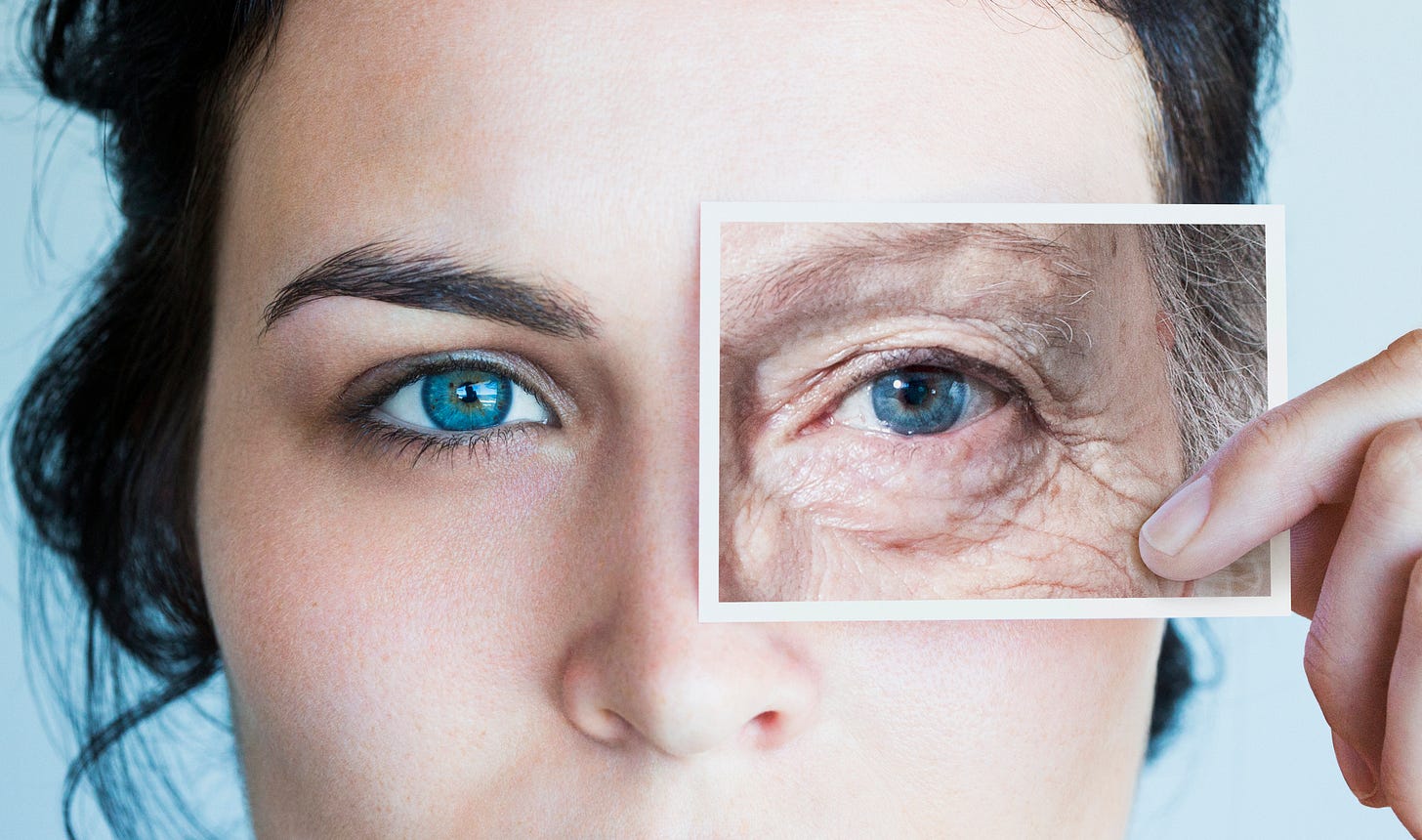Age Before Beauty (But Not If I Can Help It)
40 Billion Dollars and a Lot of Metaphysical Confusion.
General Relativity in Twenty Cardboard Pages
I have never particularly understood the mechanics of time. The closest I’ve gotten was while reading a picture book on General Relativity to my three-year-old cousin. Perhaps if someone had read that to me as a child, I’d be in better shape. But I do understand one thing, or at least I have no evidence to refute it: time moves forward.
Linear time seems to be one of the rules of the universe. I think it’s a rather nice rule, too, since “linear” is a pretty word, and I understand what it means. Linear time is predictable. Things are born, and then they die. My face in my early 20s is lightly scarred from adolescent acne. There are shallow wrinkles creasing my forehead, probably from a lifetime of being surprised. Someday, those scars will pucker, and the wrinkles will deepen into folds. My smile will fall into smile lines, and metaphorical crows will walk across my eyes. I, like everything, will age, and I will watch it happen.
We’re taught from a very young age that showing signs of growing old is a bad thing. At 15, I was prescribed topical retinol for acne management. Retinol is primarily used for anti-aging, as it causes rapid skin cell turnover. I was told this would keep my skin looking like a teenager’s, despite the fact that I was at the dermatologist to stop my skin from looking like a teenager’s.
Aging Ungratefully
There are a number of reasons why we try to look younger. Biologically, the appearance of age gives signals about reproductive capabilities, at least for women. Cute things, like babies, puppies, and those little teacup pigs that are a complete scam, stimulate pleasure centers in the brain. We’re cuter when we’re younger, with full cheeks and big eyes that haven’t yet seen the horrors of the first hangover after 30.
Being young, and looking like it, also has social currency. Stupid decisions at 22 are stories for later, stupid decisions at 42 are lawsuits. The forward march of time robs us of the freedom we have when we’re young, the permission to make mistakes, to be unrestrained in our self-absorbance. Not only are we free and full of potential, we’re also beautiful.
But we’ve created a Western culture where the worth of youth has turned into the worth of looking young. On a widespread scale, we’re not attempting to stay young forever, though rich weirdos like CEO Bryan Johnson are spending over $2 million every year to return to the biological age of 18. (Having been 18 far more recently than the 45-year-old Mr. Johnson and having been in the company of 18-year-old boys, I think this is a waste of money.) Mr. Johnson is at war with time, and I’d say the rest of us are engaged in skirmishes.
While we fight to maintain youth, we still revere the benefits of age. Try applying for a job where entry-level positions ask for years of relevant experience. Mr. Johnson is not trying to live like an 18-year-old forever; he’s trying to be 45 with the body of an 18-year-old. The goal is not to reside permanently in our social adolescence but rather to hold a unity of opposites: the look of youth with the fulfillment of age. We want to be what we think the ultimate human is: wise beyond our visual years.
We’re meant to hate time yet reap its benefits. This is a very human contradiction. Our search to defy time’s effects on our bodies is dehumanizing. It takes us away from our place in the natural world, but running away from what’s meant for us is predictably human; it’s even the plot of Oedipus Rex. At least Oedipus had a little fun before his fate caught up to him; all I’ve done is apply retinol and spend my savings on sunscreen.
A (tiny) Tree Grows In Brooklyn
In cities, you’ll sometimes see young trees being planted on the sidewalks. I’ve never really respected these vertical twigs, as I don’t like to consider anything a tree that I could feasibly destroy with a calculated whack of my backpack (though this may say more about the weight of my backpack than the strength of a baby tree).
I grew up on a farm with a driveway lined by ancient pine trees, and by ancient, I mean that they were there before I was. One day, those baby trees on the sidewalk will look like those pine trees. They’ll grow gnarled and have the initials of short-lived couples carved in their bark. Dogs will pee on their bases, and people will spit on their roots, and then I’ll think, “now that’s a tree.” They will have honestly gone through time, and they will look like it. There is no retinol for trees, though no doubt someone in a co-op in Brooklyn will soon suggest it.
Time is what aged those trees, and time is what is aging me. The visible effect of time through growth, for both trees and humans, is what unites us as part of the natural world. But of course, we don’t want to be part of the natural world since a tree is a tree, and we’re the inimitable human race.
One Einstein Quotation For Dummies
Image: sciencealert.com
Now, there are two problems for me. One is that trying to look young, even when you are, is expensive. Anti-aging is a $40 billion industry as of 2020, in part because the retinol I use for acne costs over $100 per tube before insurance. (I buy mine from Canada to save money and get a little thrill through legal smuggling.)
The other is that we’re spending all this money to fight something that I don’t understand. At least this problem is free.
I really only understand time through the practices we’ve put in place to mark it. I found learning to tell time frustratingly difficult as a child, which has been made worse in adulthood by my mistake of buying a wristwatch with only the 3, 6, 9, and 12 marks. Children’s books about spacetime are beyond my grasp–there was a diagram about time dilation, and I took advantage of the fact that my cousin doesn’t know how to read and skipped past that part as fast as I could. As far as I’m concerned, dilation is what the optometrist does to my eyes, and given how little I enjoy that experience, I probably won’t like the time version either.
Einstein, who is the reason I have to read picture books about General Relativity in the first place, said that the “past, present, and future is only a stubbornly persistent illusion.” I prefer Douglas Adams’ version, “Time is an illusion. Lunchtime doubly so.” If Einstein thought time was an illusion, then I’d like to know why my retinol costs so much. Not that Einstein had much sway over the cosmetics market, but if time is an illusion, so is $40 billion.
Time seems like the easiest attempt to create order. If a clock ticks forward, we can be late for things. It gives meaning to the sun rising and setting and to life and death. In the most pedestrian sense, time explains why things are the way they are. It gives us an articulation of grief at the death of a child who was supposed to have so much more ahead of them. It gives us the satisfaction of a life well-lived, having made the most of what we were given.
I don’t know where time comes from, in part because I can’t see another way to interpret the world. Even sitting at my laptop, pondering my next sentence (I hope it’s a good one), I am conscious of time. I have been taught to see my life as an exercise in perpetual motion (that’s a decent sentence, I think, though I had higher expectations). As I typed those little parentheticals, time passed (and was a little bit wasted).
Obviously, I was not around when we figured out the concept of time. If I was, I’d like to think I’d have named it something cooler. But I understand why we created the image of time moving, whether it be forward, back, or just a bit to the left.
Time moves so that we don’t change in stillness. If we never had this concept of advancing time, aging would be existentially terrifying. Why are our bodies doing that? Why does a scraggle of branches (which I don’t respect) turn into a towering pine (which I do) if nothing around us is moving? Time may be an illusion, it may not be. I couldn’t even nail down General Relativity with a children’s book, so who am I to say?
But whether time is an illusion or not, our understanding of it is a human interpretation. In regards to aging, our language of “movement” makes sense; anything that moves can be stopped or at least slowed. When we’ve made time an enemy, we have made it a linguistically conquerable one. So while time ages and buries us without mercy, we’ve created an understanding of it that is not inevitable.
Sisyphus’ Face Cream
Aging is an unstoppable object, and humanity thinks we’re an immovable force. We think we’re so powerful that we can live outside the forces of time, in part because we’ve created a linguistic framework where we should be able to. This is an expensive and dehumanizing effort and, at the same time, a predictably human one. It’s full of contradictions, just like our opposing desires to look like we’re young and make money like we’re old.
Time doesn’t have contradictions, though, or at least I think it doesn’t. (Don’t tell me if it does–if it can’t be expressed on my watch that’s missing a lot of numbers, I don’t think I can handle it.) Time moves forward, and it’s taking us with it, kicking and screaming, although I think my cousin’s picture book is trying to tell me it’s not that simple. We’ll get old, and we’ll look like it, and then we’ll die. I’m sure we’d all feel a lot better about ourselves if we accepted that fact, but I don’t think we’re going to.
Far be it for me to be on the side of capitalism, but I don’t see humanity giving up this contradictory (and expensive) fight anytime soon. It would mean admitting we’re really no different than trees in the universe’s unforgiving eyes. It would mean admitting powerlessness in the face of a larger truth, which we may not be able to conceptualize. (Yes, by we, I mean me.) It would mean that we can’t hold two opposing truths in balance.
Maybe that’s what being human is, holding onto contradictory things until time comes for us. I just wish that we could decide to hold onto less expensive things.









Great writing!